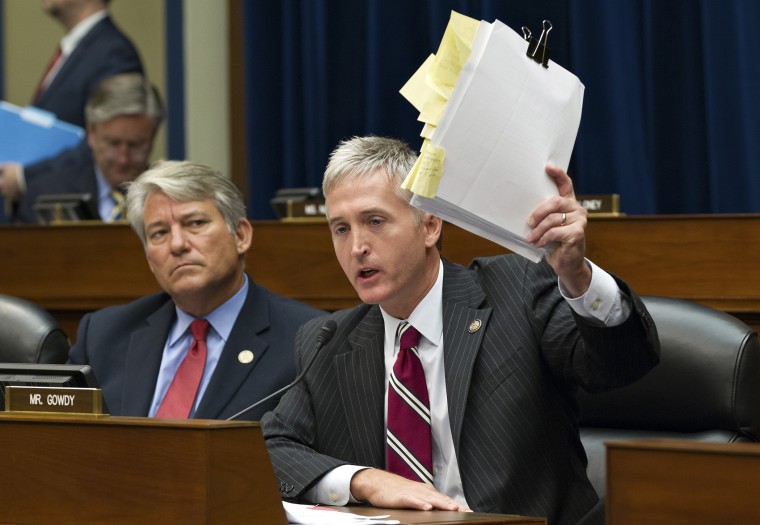Democrats on the House Select Committee on Benghazi are accusing Republicans of conducting crucial interviews in secret and withholding information. The tensions between the two parties erupted into the open on Monday after a letter from the panel's top Democrat, Rep. Elijah Cummings (Md.), criticizing Chairman Trey Gowdy's (R-S.C.) handling of the investigation went public. Cummings said Republicans were holding meetings with witnesses, including Deputy Assistant Secretary of State for Maghreb Affairs Raymond Maxwell, who claims he was instructed to edit documents relating to the 2012 attacks. He said that Democrats were being excluded from these Republican-only meetings. Democrats say they have never asked Gowdy to require witnesses to meet with them, just that when witnesses are willing to sit down with both sides, they be included.
Benghazi committee veers onto predictable path
Democrats wanted a bipartisan process. We now know why Republican leaders refused the request.

When the House Intelligence Committee wrapped up its investigation of the 2012 attack in Benghazi, Libya, it was the seventh congressional committee to weigh in on the deadly terrorist violence that killed four Americans. The Intelligence panel's findings, all of which discredited right-wing conspiracy theories, were intended by its Republican authors to be the "definitive" congressional statement on the attack.
But GOP leaders didn't much care, and soon after announced they would continue to support an eighth committee to do what the other seven committees had already done. This other, select committee spent $1.5 million in taxpayer money last year to review facts that have already been reviewed, and the panel, led by Rep. Trey Gowdy (R-S.C.), is digging in for more unnecessary efforts in 2015.
The committee is off to a not-so-sterling start.
In a four-page letter to the far-right South Carolinian, Cummings told Gowdy, "You have had different standards for Republicans and Democrats participating in the investigation, secret meetings with witnesses, and -- perhaps most importantly -- withheld or downplayed information when it undermines the allegations we are investigating."
The response from Gowdy's office was a classic:
"Chairman Gowdy will talk to Benghazi sources with or without the Democrats present just as they are welcome to talk to sources with or without Republicans present," the committee's communications director said in a statement yesterday.
Can't you just feel the bipartisanship?
The committee is ostensibly searching for objective truths -- facts that have already been uncovered by seven other congressional committees and the State Department's independent Accountability Review Board. But as part of the process, Republicans on the panel will conduct their own private interviews with witnesses, which Gowdy believes is fine because Democrats can do the same thing.
In other words, Gowdy, a former prosecutor, apparently sees this as an adversarial process -- the congressional committee isn't acting as a fact-finding team, so much as it's divided against itself, with Republicans conducting Republican-only interviews, and the Republican chairman issuing his own subpoenas without Democratic input.
When GOP leaders were putting this panel together last year, Democratic leaders urged them to create a genuinely bipartisan panel -- in keeping with the historic, traditional norms for similar committees -- with an equal number of members from both parties, and a collaborative process that would help guarantee the integrity of the findings.
We now know why Republicans refused the Democratic request.
Rep. Adam Schiff (D-Calif.) added in a statement, "When the select committee was first formed, I was deeply skeptical that it would operate fairly and allow Democrats to meaningfully participate. Now, after learning that we have been excluded from parts of the investigation, and that the Majority has held secret interviews with key witnesses and withheld information when it conflicted with their chosen narrative, I fear this skepticism may have been all too justified."